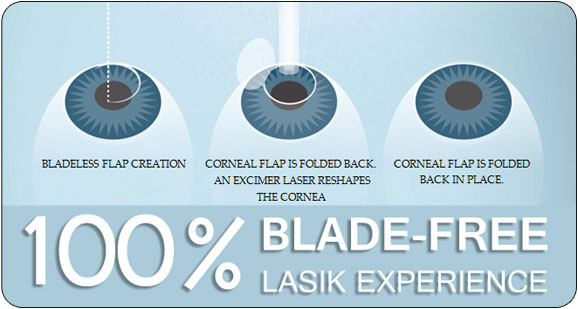 What to Expect from LASIK Eye Surgery in Denver
What to Expect from LASIK Eye Surgery in Denver
LASIK, or Laser Assisted In Situ Keratomileus, refers to refractive eye surgeries that are much simpler than that long acronym might lead you to believe. These laser eye surgeries are among the most frequently performed elective out patient procedures, used to correct many common vision problems.
The LASIK procedure, which typically only requires approximately 15 to 20 minutes, includes the following steps:
Consultation – During a consultation, our Denver LASIK specialists will determine if you are a suitable candidate for laser eye surgery, and will design a customized treatment plan for you needs.
Local Anesthetic – To prepare you for the treatment, anesthetic eye drops will be used to numb your eyes.
Corneal Flap – A flap will be created in your cornea so that the eye surgeon will be able to access and reshape the inner corneal tissue. State-of-the-art mapping technology is utilized to ensure precise results.
Recovery – The surgeon will carefully reposition the corneal flap back into its original position. The flap will naturally adhere and contour to the eye. You will be given protective eyewear that will help discourage you from rubbing your eyes. The corneal flap will heal within several hours following the surgery. During this phase, it is not uncommon to feel slight discomfort or irritation, but these symptoms typically diminish quickly.
Results – While it can take a few weeks for you to experience the full impact of the laser correction surgery, many patients see dramatic improvement in their vision the morning following surgery, and can be back to work within two to three days. While it is recommended that you avoid strenuous activities during the weeks following your surgery, you will find that you will quickly be back to your normal routine.
Understanding the Different Types of Laser Eye Surgery
Not every patient will be a suitable candidate to receive LASIK eye surgery. Some individuals may have previous medical conditions that complicate the process, or may have corneas that are not the ideal shape or thickness for LASIK. A commonly performed and very successful alternative to LASIK is PRK.
PRK, or Photorefractive Keratectomy, is a surgical procedure that reshapes the cornea without the use of the corneal flap. Instead, a very thin layer of cells is removed from the surface of the cornea to give the laser eye surgeon the necessary access to the corneal tissues.
Because cells are removed from the surface of the cornea, patients who undergo PRK experience slightly more discomfort and a longer recovery period than those who receive LASIK, as these cells need to regrow.
While these two laser eye surgeries may differ in their implementation and recovery process, they each reshape the cornea, providing long-lasting, effective results.
Receive a Free Laser Eye Surgery Screening in Denver, Colorado
If you are considering LASIK eye surgery, do not hesitate to learn more about these innovative procedures. Satisfied patients are continually visiting us to let us know how much these treatments have changed their lives and can be read about on our Blog.
We invite you to contact us today at (303) 997-1720 to schedule a consultation. We will help you understand your laser eye surgery options and what your potential outcomes will be.
